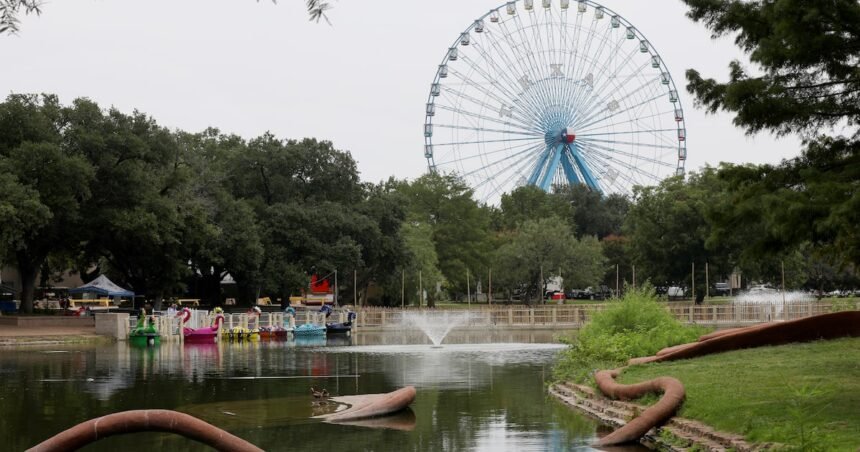Dallas Park Board President Arun Agarwal says he wants a “100% reset” of the organizations managing Fair Park and wants a public process to deliberate if Fair Park First, the nonprofit that raised about $60 million for a long-promised community park and refurbishing a collection of historic buildings at the 277-acre complex, should retain its fundraising role.
“We will do everything to make sure donor confidence is not compromised,” Agarwal told The Dallas Morning News on Friday, adding that a public process was necessary to reverse perceptions of malfeasance in the park’s finances.
Nearly $6 million in restricted donor funds were misspent on park operations, according to a report released last year. The nonprofit and venue management company are still negotiating a pathway to recoup the misspent dollars.
While that’s still underway, the city announced Wednesday it would terminate its contract with the nonprofit and its subcontractor Oak View Group. The contract gave Oak View Group the authority to control financial decisions and set up bank accounts, though the venue management company contends it was acting under the nonprofit’s direction.
While noting the need for a fundraiser, the city’s announcement was silent on whether Fair Park First would continue the work of raising funds, managing community engagement and overseeing the construction of the park.
Veletta Forsythe Lill, Fair Park First’s board chair, said the nonprofit was moving into a conservancy model and was committed to constructing a park to make amends to nearby communities that had been razed using eminent domain in favor of building parking lots.
Lill has been emphatic about the nonprofit’s perspective and has said the goal to tweak the contract was to stabilize and give the organization ability to oversee its own operations.
“Fair Park First, in its narrow prescribed operations over the last six years, has done what it was supposed to do in terms of raising money, engaging the community and doing community programming,” Lill said.
The burning concern is how the recent developments might influence donor confidence. “All of the grants are direct contracts with Fair Park First, not others,” she said. “Those are the contracts that have to be honored in the building of the park.”
The city has not entered a new contract with the nonprofit, though at least one elected official, council member Adam Bazaldua, has said in a previous statement that he looked forward to working with Fair Park First.
Ryan O’Connor, a top park official who oversees partnerships and strategic initiatives, said the Park Board and the City Council will still need to vote on a contract with a nonprofit organization to perform fundraising and other related services.
The nonprofit will also sign a development agreement to give the entity the right to develop the community park, though the organization would still need city approval for design and other related services.
“From my experience with the city, both being involved with them for many, many decades and being on City Council, I believe that it will have to be an open, competitive process,” said Ron Natinsky, executive director at the Texas Discovery Gardens, which is also a tenant in Fair Park.
The Texas Discovery Gardens have been struggling with nearly a million dollars worth of repairs that have come out of the nonprofit’s rainy day fund and was meant to be overseen by the Oak View Group.
“I’m actually fairly confident with the city’s plan to move forward,” Natinsky said. “The part that would give me some pause would be if indeed the same nonprofit was left in charge as they have been previously.”
From Fair Park First’s perspective, the nonprofit has had limited control over financial decisions at the park. The nonprofit since then has separated donor funds and collaborated with Dallas Foundation, another nonprofit that specializes in helping philanthropic initiatives. They also expect to hire a new CEO later this year.
Former council member Lee Kleinman, who was on the City Council when officials were deliberating the public-private partnership, said the model was envisioned to oversee three components: fundraising and advocacy management, concession stands and building a park.
“If we can say OK, [Fair Park First] did OK at fundraising, let’s keep them there,” Kleinman said, adding that the parks department could oversee the management of the concessionaire and build the park for South Dallas.
The Dallas Park and Recreation Department, he said, “has built almost a billion dollars worth of park and park amenities in the last 20 years. So let’s give it to the people who can do the job, and that would be, to me, a good outcome.”











